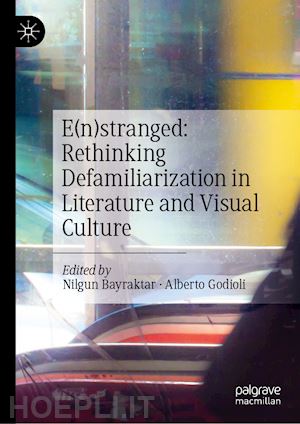
Questo prodotto usufruisce delle SPEDIZIONI GRATIS
selezionando l'opzione Corriere Veloce in fase di ordine.
Pagabile anche con Carta della cultura giovani e del merito, 18App Bonus Cultura e Carta del Docente
Variously translated as “estrangement,” “enstrangement” or “defamiliarization,” Viktor Shklovsky’s concept of ostranenie is more relevant than ever. This collection offers new insights into the theories and practices of ostranenie across various languages and cultures, with a particular focus on the 20th and 21st centuries. Our current era is marked by a dramatic redefinition of the normal and the strange, the familiar and the weird. The rise of far-right populism has increasingly normalized xenophobic and nativist stances previously confined to the fringes of the political spectrum. Additionally, the climate crisis has led to the ongoing renegotiation of the concepts of normalcy and emergency amid widespread efforts to adapt to the “new (ab)normal.” Exploring defamiliarization provides a unique perspective to comprehend and question these processes and their profound cultural implications.
Focusing on ostranenie also offers valuable insights into how aesthetic forms serve a political function. Defamiliarization can take on various forms, including retro-futuristic dystopias, stylized films, and darkly humorous cartoons and memes. It can be an effective tool for political activation that relies on formal innovation rather than superficial emotional engagement.
This collection brings together the work of a group of scholars examining defamiliarization across different media. It explores questions such as: How can we differentiate between various forms of defamiliarization and analyze their effects on the reader/viewer? How is defamiliarization connected to the weird, the eerie, or the uncanny? As a result, the collection offers an updated theoretical framework for understanding the wide range of emergent artistic and literary practices of e(n)strangement in the current era and their significant political affordances.
Chapter 6 is available open access under a Creative Commons Attribution 4.0 International License via link.springer.com
1. Introduction.- 2. Fear of the Strange: On Weird Ontologies and Eerie Agencies.- 3. The Upside Down of an Italian Summer: Human-Nonhuman Enmeshment and Defamiliarization in Michele Mari’s Verderame.- 4. Making the Strange Familiar: Getting Intimate with Toxicity.- 5. Weirding Europe: Fiction and Ghostliness as Grammars of Resistance in Kivu Ruhorahoza’s Europa, “Based on a True Story” (2019) and Recent Protest Events.- 6. Joking Against Humanity? Dark Humor and (De)familiarization.- 7. Familiarly Strange/Strangely Familiar: Humor and Contemporary Artists from Turkey.- 8. Ostranenie, “The Montage of Attractions” and Early Cinema’s “Properly Irreducible Alien Quality”.- 9. Mind the Gap! Towards a Transdisciplinary Theory of Aesthetic Negativity.- 10. Cultural Physics of Defamiliarization, Learning, Consciousness, and Metaphors.- 11. Strangers in Paradise: Migrant Figurations in Media Culture.- 12. “Inside - Out” and “Making Strange” by the Stranger.
Nilgun Bayraktar is Associate Professor of Film History, Theory, and Criticism in the History of Art and Visual Culture Program and Film Program at the California College of the Arts, USA.
Alberto Godioli is Associate Professor in European Culture and Literature at the University of Groningen, the Netherlands, and Programme Director of the Netherlands Research School for Literary Studies.











Il sito utilizza cookie ed altri strumenti di tracciamento che raccolgono informazioni dal dispositivo dell’utente. Oltre ai cookie tecnici ed analitici aggregati, strettamente necessari per il funzionamento di questo sito web, previo consenso dell’utente possono essere installati cookie di profilazione e marketing e cookie dei social media. Cliccando su “Accetto tutti i cookie” saranno attivate tutte le categorie di cookie. Per accettare solo deterninate categorie di cookie, cliccare invece su “Impostazioni cookie”. Chiudendo il banner o continuando a navigare saranno installati solo cookie tecnici. Per maggiori dettagli, consultare la Cookie Policy.